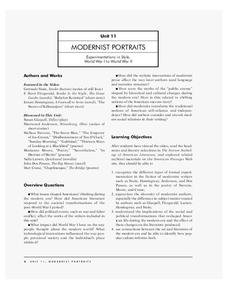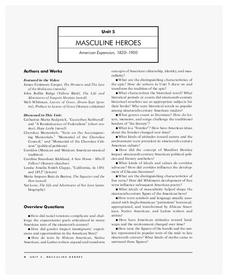Annenberg Foundation
Migrant Struggle
The American Dream is a goal that many pursue, but is it truly attainable for all people? An in-depth lesson explores the plight of migrants in twentieth-century America. The resource includes a video and author biographies and...
Annenberg Foundation
Modernist Portraits
How did literature reflect people's attitudes in post-World War I America? A lesson explores the topic using a variety of activities. Individuals watch and respond to a video; read author biographies and engage in discussion; write...
Annenberg Foundation
Rhythms in Poetry
Rhyme, rhythm, free verse, imagery: Do these words describe poetry, or jazz music? The answer is both! A resource explores these similarities as scholars watch a video, engage in discussion, read author biographies, write poetry and...
Annenberg Foundation
Social Realism
Many American writers in the late nineteenth century wanted their writing to reflect real life. Individuals watch and discuss a video, read and explore author biographies, write a journal entry and a poem, and complete a multimedia...
Annenberg Foundation
Slavery and Freedom
How do nineteenth-century texts by African American and Native American writers contribute to the country's ideals of freedom and individuality? Learners explore the topic by watching and discussing a video, reading biographies, writing...
Annenberg Foundation
Masculine Heroes
What were the driving forces behind American expansion in the nineteenth century, and what were its effects? Scholars watch a video, read biographies, engage in discussion, write journals and poetry, draw, and create a multimedia...
Annenberg Foundation
Spirit of Nationalism
What were the virtues and values that helped form America? Pupils watch and discuss a video, read biographies of early Americans, chart the differences between early American religious movements, write journals and letters, draw, and...
Digital Public Library of America
Teaching Guide: Exploring Little Women
Louisa May Alcott's Little Women is a literary masterpiece as well as a timestamp of the formative mid-nineteenth century in America. Using a primary source set of photographs, letters, and portraits, readers discuss the ways...
Annenberg Foundation
Utopian Promise
Scholars learn all about the Puritans in the third installment of a 16-part lesson series. After watching a video, they read and discuss biographies of Puritans and Quakers from American history, write journal entries and poetry, and...
Annenberg Foundation
Exploring Borderlands
What motivated Europeans to explore the New World, and what effects did their exploration have on Native American populations? The second installment of a 16-part American Passages series prompts pupils to watch a video and read several...
West Virginia Department of Education
Intelligence of Authentic Character - News Coverage and John Brown's Raid
The resource, a standalone, shows how news coverage of John Brown's Raid began when the event happened and how that reporting shaped perception in West Virginia history. The resource includes interesting anticipatory discussion...
Constitutional Rights Foundation
How the First State Constitutions Helped Build the U.S. Constitution
Did you know that the United States Constitution was adopted after many state constitutions were already in place? Young scholars examine facts about the influence of states through an informative and interesting resource. Groups then...
Constitutional Rights Foundation
Harriet Tubman and the End of Slavery
Harriet Tubman saved hundreds from slavery through what was called the Underground Railroad. Teach learners about her amazing accomplishments through the article that uses effective direct instruction. After reading, scholars break into...
Constitutional Rights Foundation
The Lincoln-Douglas Debates — Springboard to the White House
The Lincoln-Douglas Debates saw two primary political candidates debating seven different times about one of the most important social movements in United States history. Middle and high schoolers read an article that describes the...
Constitutional Rights Foundation
Sam Houston: A Study in Leadership
Learners read a short excerpt from a speech by Sam Houston and answer corresponding questions as well as engage in additional activities, including writing a persuasive essay and discussing topics in small groups. The resource helps lay...
Smithsonian Institution
The Price of Freedom: Americans at War
An interactive resource covers all of the United States' most prominent and influential historic wars including the Vietnam War, the Cold War, the War of 1812, and the Korean War. Learners observe cause and effect as well as how violence...
Smithsonian Institution
Conflicting Voices of the Mexican War
Americans wanted to fulfill Manifest Destiny, and this pattern continued with the Mexican War. The resource specifically teaches about the Mexican War through a variety of exercises including a research project, group work, brainstorming...
Constitutional Rights Foundation
If Men Were Angels: Teaching the Constitution With the Federalist Papers
Much like the methods of group work, the writers of the Federalist Papers worked together to advocate for their viewpoints against the anti-federalists. The resource enables learners to break into small groups and conduct research before...
Smithsonian Institution
Students’ Response to 9/11—A Documentary Report
Young historians research the devastating attacks of 9/11 and use that information to script their own documentaries. The follow-up activity includes recording the documentary and conducting classmate interviews,
Smithsonian Institution
The Soldier’s Experience—Vietnam versus World War I
The Vietnam War and World War I were two very important—and different—wars. To understand the differences, and similarities, class members watch videos, examine primary source documents, and then create a newscast that examines the...
Smithsonian Institution
Cuban Missile Crisis
The United States—specifically John F. Kennedy—played a large role during the Cuban Missile Crisis. A history resource poses questions that encourage critical thinking as well as in-depth analysis of images from the time period.
Smithsonian Institution
Battle of the Bulge: America Responds to a German Surprise
World War II and the Battle of the Bulge are the focus of a history resource. Exercises include analyzing images, writing letters in the mindset of a soldier, and even immersing oneself in a cold experience to better empathize with the...
Smithsonian Institution
Changing Gender Roles on the Home Front
Many historians discuss how gender roles changed because of World War II, but how did this come to be? An informative resource challenges scholars to do some digging and research the information for themselves. They research how...
Global Oneness Project
Repairing the Fabric of Democracy
During elections, headlines constantly lament the issue of low voter turnout. Help class members understand why this is such an important topic with relevant articles, a discussion of both sides of the issue, and a reflective essay.

























